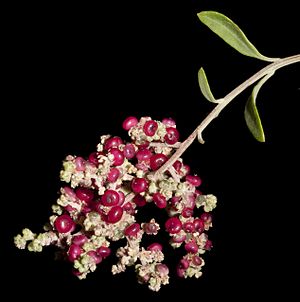Chenopodium baccatum facts for kids
Quick facts for kids Chenopodium baccatum |
|
|---|---|
 |
|
| Scientific classification |
|
| Kingdom: | Plantae |
| Clade: | Tracheophytes |
| Clade: | Angiosperms |
| Clade: | Eudicots |
| Order: | Caryophyllales |
| Family: | Amaranthaceae |
| Genus: | Chenopodium |
| Species: |
C. baccatum
|
| Binomial name | |
| Chenopodium baccatum Labill.
|
|
| Script error: The function "autoWithCaption" does not exist. | |
| Synonyms | |
|
Rhagodia baccata (Labill.) Moq. |
|
Script error: No such module "Check for conflicting parameters".
Chenopodium baccatum, also known as berry saltbush, is a type of shrub. It is found only in Western Australia. This plant is known for its bright red berries.
What it Looks Like
The berry saltbush is a spreading shrub. It can grow up to two metres (about 6.5 feet) tall. Its leaves are shaped like an oval. The flowers grow in clusters called a panicle. After the flowers, the plant grows small, red berries.
Its Name and History
This plant was first described in 1805 by a scientist named Jacques Labillardière. He gave it the name Chenopodium baccatum.
Later, other scientists studied the plant. In 1849, Alfred Moquin-Tandon moved it to a different group, calling it Rhagodia baccata. This name was used for a long time.
However, in 2012, new research showed that Rhagodia plants actually belong back in the Chenopodium group. So, the plant's name went back to Chenopodium baccatum. This shows how scientific names can change as we learn more!
Where it Grows
The berry saltbush mostly grows along the coast of Western Australia. You can find it from Geraldton in the north, down to Cape Leeuwin in the south. It also grows east along the coast to Cape Arid National Park.
Sometimes, it can be found further north near North West Cape. It can also be found inland near Wiluna. This plant is special because it is endemic to Western Australia. This means it naturally grows only in that area and nowhere else in the world.
 | Stephanie Wilson |
 | Charles Bolden |
 | Ronald McNair |
 | Frederick D. Gregory |

